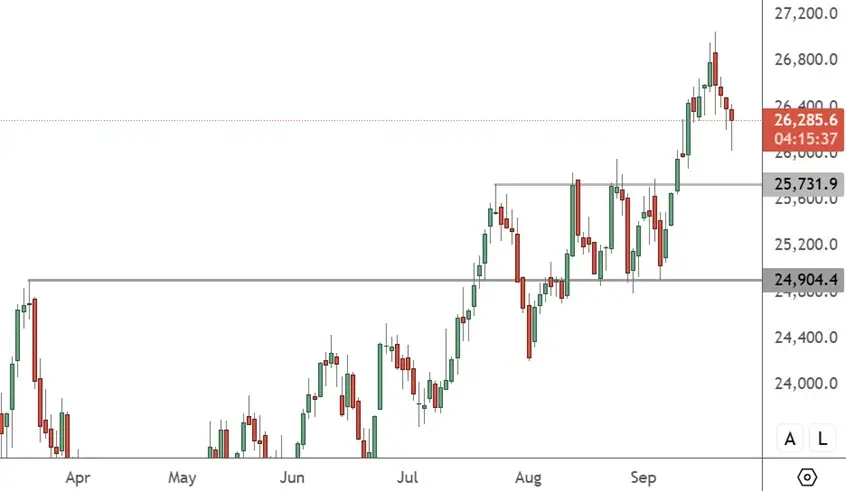Hong Kong’s top share index has been moving lower over the last week, but traders are looking to the Chinese government stimulus for a boost.

HK 50 – Daily Chart
The HK 50 has been selling for a fourth day, but buyers arrived on Tuesday close. That could signal another test of the upside. Any failure ahead has the 25,731 level for support, with a larger target at 24,904.
The gap between China’s weak economy and its booming stock market continues to grow as traders pin their hopes on stimulus. That is helping the market move higher and shrug off any negative economic numbers in the near term.
August figures for production and growth were weaker. Still, traders continued to bet big on stocks, and overseas investment has also grown in strength after a period of ignoring China’s market. Another boost for shares has been underperformance in other assets, such as property.
William Bratton, equity analyst at BNP Paribas, said, “The pressure to save is fading.” With up to $23 trillion in Chinese household savings, his company is now “structurally positive” on domestic equities.
The recent move higher has been mainly driven by institutional investors and foreign money, according to Goldman Sachs. However, many analysts are optimistic that retail buyers will join in greater numbers. U.S. investment bank J.P.Morgan thinks up to $350 billion from households will move into China’s stock market by the end of 2026.
Bond returns continue to be poor in comparison to recent years as the 10-year benchmark yield in China sits at 1.80%, lower than the five-year average of 2.58%. The government has now resumed taxing interest on bonds, forcing investors to reconsider.
The property sector is another area that has failed to attract investors, having been burned by the previous year’s collapse. President Xi Jinping has made it clear that “houses are for living, not for speculation,” and this serves as a warning to investors not to become too heavily involved in buy-to-let deals.
China International Corp. stated that real estate now accounts for 58% of household wealth, down from 74% in 2021. During the same period, stock market exposure and other speculative vehicles rose from 9% of wealth to 15%.
The booming IPO market in Hong Kong this year may cool ahead of next year, but the arrival of big-name corporations can help keep trading volumes strong for years to come.
The recent downturn in stocks may find a floor for another attempt at the recent highs. The huge household wealth supply is also waiting to be tapped if investors become more bullish on the economic outlook.


